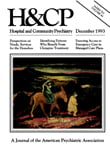Inpatient Treatment of Patients With Severe Obsessive-Compulsive Disorder
Abstract
Patients with obsessive-compulsive disorder may experience severely disabling symptoms and require hospitalization. Based on treatment of 77 such patients admitted to a long-term general psychiatric research unit over a seven-year period, the authors present pharmacologic, psychosocial, and behavioral managment strategies for treating these patients on general psychiatric units. The treatment guidelines require only modest modifications of standard practice and can be adapted for use on general units without specialized staff training. Some patients with obsessive-compulsive disorder exhibit strong control and dependency needs and disrupt the milieu in characteristic ways. These patients may generate conflict among staff about whether the patients can control obsessive-compulsive behaviors; they may anger other patients because of the large amount of staff attention they demand. Educating staff about obsessive-compulsive patients' control and dependency needs and enlisting the support of fellow patients can improve the milieu.
Access content
To read the fulltext, please use one of the options below to sign in or purchase access.- Personal login
- Institutional Login
- Sign in via OpenAthens
- Register for access
-
Please login/register if you wish to pair your device and check access availability.
Not a subscriber?
PsychiatryOnline subscription options offer access to the DSM-5 library, books, journals, CME, and patient resources. This all-in-one virtual library provides psychiatrists and mental health professionals with key resources for diagnosis, treatment, research, and professional development.
Need more help? PsychiatryOnline Customer Service may be reached by emailing [email protected] or by calling 800-368-5777 (in the U.S.) or 703-907-7322 (outside the U.S.).



